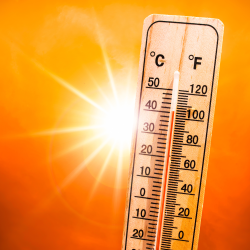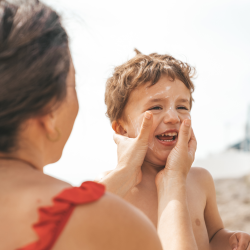
Hot weather can bring health problems with it. Particularly in very young, or elderly people. Read the information below to find out how you, and your family, can stay safe this summer.
Tips to help you stay well during hot weather
- drink plenty of water, or other cold drinks, to prevent dehydration
- avoid alcoholic drinks because they can make dehydration worse
- keep your body cool
- stay out of the sun
- eat smaller, cold meals, such as salads and fruit
- wear light-coloured, loose-fitting clothes made from natural fibres (such as cotton)
- take cool or tepid showers or baths
Protect your skin
It is important to remember that the ultraviolet (UV) radiation increases in Summer, regardless of the weather. Exposure to UV rays increases your risk of developing skin cancer. The UV index ranges from 1 to 11+ (extreme), and changes throughout the day.
- wear sun-protective clothing that covers as much skin as possible
- use broad-spectrum, water-resistant SPF30 (or higher) sunscreen. Put it on 20 minutes before you go outdoors and every two hours afterward. Sunscreen should never be used to extend the time you spend in the sun
- cover your head with a hat – broad brim or legionnaire style to protect your face, head, neck and ears
- stay in the shade
- wear sunglasses – make sure they meet Australian Standards
- check your skin for signs of skin cancer. Click here to find out more


Keep your home cool
- shut curtains and blinds during the day
- spend time in places with air-conditioning, such as a library, shopping centre, cinema or swimming pool
- stay in the coolest room in the house and avoid using the stove and oven
Take care of others
- visit or call elderly friends, neighbours or relatives at least once a day
- encourage them to drink cold water
- you may like to take them to a shopping centre, library or cinema with air-conditioning
- remind children to drink water
- babies, children or animals should never be left alone in a car, even if the air-conditioner is on
- ensure animals have water and plenty of shade if they are outside.
Swim safely
Drowning is the greatest cause of accidental death in children under five in Australia.
- swim between the flags
- recognise rips and know what to do if caught in one
- avoid alcohol and drugs
- fence swimming pools in and shut the gate
- always supervise children, and keep an eye on friends and family around water
- learn how to resuscitate someone
To find out more visit Surf Life Saving or Laurie Lawrence.
Have a plan
- keep an eye on the weather forecast
- know who to call if you need help
- ask your doctor if you have any health conditions that mean you are at greater risk of heat-related illness, and what you need to do about them to keep well in the heat
If you are unwell, contact your doctor or go to the nearest hospital emergency department. If you think your symptoms are serious, call for an ambulance immediately on triple zero (000). See the sections below for when you may need to seek medical help.
Keep your food safe
- make sure food that needs refrigeration is properly stored
- defrost foods in the fridge, not on the kitchen bench
Find out more about:
Caring for the elderly
- Dark coloured urine, or not going to the toilet frequently
- Lightheadedness especially on standing
- Dry mouth
- Increased heart rate
- Increased breathing rate
- Low blood pressure
- Keep them hydrated with food and drink. (This could include water, juice, tea, coffee, or isotonic drinks.) Be aware that some vitamins or medical conditions may darken urine. The amount of fluid an individual needs to consume will depend on the heat, humidity, any medications and whether they have been exercising.
- Keep them as cool as possible
- Keep in regular contact and monitor their well-being
- Make sure they have access to a bathroom so they aren’t discouraged from drinking
- Encourage them to rest more and avoid over-exertion. They may not be able to do as much as they usually can when the weather is cooler. They should be cautious about doing activities, especially during the hotter parts of the day.
- Remember there can also be a risk of over-hydration and hyponatremia
Climate Change is a health issue
Climate change is increasingly harming our health – through extreme weather, severe heat, infectious disease, increased allergens, and mental health impacts. The most vulnerable people are being impacted the most.
Sydney North Health Network is the first Primary Health Network in Australia to develop a Climate and Health Strategy. Find out more about what you can do to help combat climate change.
Planning for an emergency such as a fire, flood or heatwave
To find out more about planning for extreme weather please click here.
